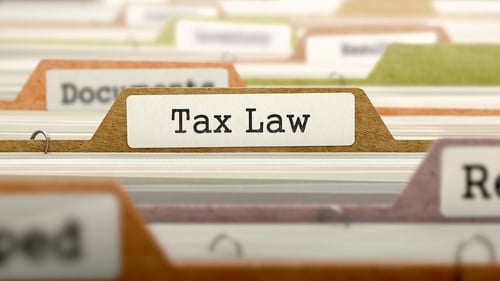Powell Tax Law Blog

Reminder: Report All Income Including Gig Economy Jobs and Tips to IRS
Paying taxes on your income in the U.S. used to be straightforward. Your employer provided you with a paycheck and did all the heavy lifting when it came to calculating withholding for taxes.
At the end of the year, it was a matter of copying your W2 number onto your 1040 form correctly, and then cursing (paying what you owed!) or cheering (awaiting your refund!).
Since the rise of the gig economy and the increasing popularity of the digital tipping culture, however, workers are getting paid in a much different fashion than in the past, and if they fail to report all their income to the IRS properly, they find themselves in the crosshairs of an audit.
How We Work … and Get Paid … Has Changed in America
Not properly reporting all your income previously was the domain of those doing small jobs such as babysitting for cash, or those truly looking to cheat the tax system.
Today, however, we have an economy built on side hustles, freelance and non-traditional work and those in the service industry receive an increasingly large portion of their income via tips as the U.S. tipping culture has only increased during the pandemic.
“Freelance and contract work, gigs, and side hustles are growing features of the modern workforce,” says McKinsey & Company.
Consider these numbers:
- McKinsey’s American Opportunity Survey last year found that 36 percent of the U.S. workforce (58 million) is made up of independent workers including:
o 26 million gig and contract, freelance and temporary workers.
o 19 million contract, freelance, and temporary only workers.
o 14 million gig-only workers.
Even those with standard paychecks may also be handling other income sources as CNBC reported last month that everyone is talking about the “new tipping culture” in America.
“While the pandemic brought about a new tipping culture to support service workers and businesses early on, there seems to be a more notable shift with the emergence of digital kiosks at checkouts prompting customers to tip on to-go coffees, takeout orders and other transactions previously free from tipping culture,” reported CNBC.
Forbes reported in February that 32 percent of respondents tip more now than before COVID-19, and CNBC reported that the rise in tipping looked like this:
- In the 1950s tipping 10 percent of the bill
- 1970s to 1980s tipping rose to 15 percent of the bill
- In 2023, consumers tip between 15 and 25 percent with one survey finding an average of 21 percent.
“The coronavirus pandemic put more upward pressure on tipping. During the height of those days, consumers started tipping for things they never had before to service industry workers,” reported CNBC.
Make Sure You Report All Your Gig Economy Earnings
While all the gig economy jobs and growing tip wads are great for helping American workers combat the high inflation in today’s economy, they also can set up workers for under-reporting their true income to the IRS.
“It's important for taxpayers to file a federal tax return that has a complete and correct reporting of their income – which may mean including income from sources other than regular wages from an employer. Income from gig economy activities and tip income are two common sources of such income,” said the IRS in an IRS Tax Tip released on March 30, 2023.
The IRS reminds workers that gig economy earnings – income from on-demand work, services, or goods (such as selling goods online, driving a car for deliveries, or renting out property) -- are taxable.
Taxpayers must report income earned from the gig economy on a tax return, even if the income is:
- From part-time, temporary, or side work.
- Paid in any form, including cash, property, goods, or digital assets.
- Not reported on an information return form like Form 1099-K, 1099-MISC, W-2, or other income statement.
For more information, taxpayers should visit the gig economy tax center page of IRS.gov.
A Guide to Reporting Service Industry Tips
Workers should think twice before not reporting tips to the government, especially as tipping is increasingly done digitally, and not by cash, leaving more of an audit trail for the IRS.
“People who work in restaurants, salons, hotels, and similar service industries often receive tips for the customer service they provide. Tips are generally taxable income, and it's important for people working in these areas who regularly receive tips to understand the requirements on reporting tips,” says the IRS.
Tips are optional cash or noncash payments customers make to employees:
- Cash tips include those received directly from customers, electronically paid tips distributed to the employee by their employer, and tips received from other employees under any tip-sharing arrangement. All cash tips must be reported to the employer, who must include them on the employee's Form W-2, Wage and Tax Statement.
- Noncash tips are those of value received in any medium other than cash, such as tickets, passes, or other goods or commodities a customer gives the employee. Employees don't report noncash tips to their employer, but they must report the value of them on a tax return.
- Any cash tips the employee didn't report to the employer must be reported separately on Form 4137, Social Security and Medicare Tax on Unreported Tip Income, to include as additional wages with their tax return. The employee must also pay the employee share of Social Security and Medicare tax owed on those tips.
Employees don't have to report tip amounts of less than $20 per month per employer. For larger amounts, employees must report tips to the employer by the 10th of the month following the month they received the tips.
The employee can use Form 4070, Employee's Report of Tips to Employer, available in Publication 1244, Employee's Daily Record of Tips and Report to Employer, or they can use an employer-provided form or other electronic system used by their employer.
For more information on how to report tips taxpayers should review the Tip Recordkeeping and Reporting page of IRS.gov.
Remember there can be consequences for not following the rules.
“If the IRS audits a tipped worker and finds they’ve underreported, it can demand the employee pay all sorts of back taxes and that the employer pony up its share of uncollected payroll taxes too,” concludes Forbes. “That truth was easy to keep hidden in the shadows when tipping relied mostly on cash. Now, one of the very things helping drive the push for more tips—technology, and the digital trail it leaves—is also what the IRS hopes to use to capture its share.”







